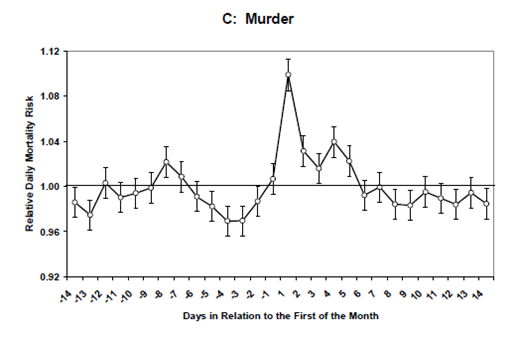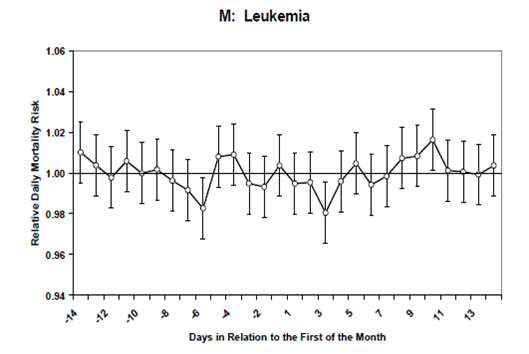Income, Health, and Payday Deaths
 Posted on March 1, 2012
Posted on March 1, 2012
It’s hardly news that poorer people have worse health on average – but teasing apart the link of income and health is harder. The income-health gradient could be because people lose income when they have health problems, or it could be due to common causes (e.g. education) rather than income itself. In fact, the relationship is more complex than you might guess; and having recently stumbled over three wonderful studies that help unpick this, I thought I’d share them with you and see what you thought.
Short-run effects: payday deaths
Probably my favourite of these studies is a lovely paper in press by Evans and Moore, using US data. Their reasoning is that if we want to know the SHORT-RUN impact of income and health, we can look at the first day of the month when most people get paid or receive welfare payments, and see if people are more or less likely to die on payday. The results are staggering.
In the chart below, you can see how murder rates vary across the month. The relate daily mortality risk is about 10% higher on payday than it is for the rest of the month, and a little bit higher for 4 days after payday.
What’s particularly striking is that this is only found for causes of death that are related to drink in the short-term. So for example, if we look at leukemia deaths in the chart below, we see absolutely no change over the month at all.
In other words, people drink more on payday, and this raises the chances of them dying. Otherwise there’s no short-run impact of payday on health.
Long-run effects: lottery winnings
Does this mean that higher incomes are actually bad for health? Well, not so fast. The deaths-by-payday charts are good for showing the very short-run impacts of income on health, but they don’t show what happens to a change in permanent income, nor do they show the longer-run impacts. The best way of getting at the causal impact of income here is to look at lottery winnings, which (unlike most sources of income) are completely random within any particular lottery.
In the UK, a paper by Apouey & Clark 2009 looks at the impact of lottery winnings on health. Like Evans and Moore, they find that this source of extra income leads to more smoking and drinking (perhaps unsurprisingly, if you think about how you personally would spend a lottery winning (or me anyway), and also the fact that people who play the lottery are going to have a different attitude to risk than other people).
Yet we also see noticeable improvements in mental health among people who win on the lottery – suggesting that financial problems genuinely cause mental health problems.
The net effect of these two patterns in Apouey & Clark is that there’s no effect of lottery winnings on self-reported general health – but while self-reported health can be useful, it also has lots of problems as a measure. A more objective measure of general health is mortality, and for this we have to turn to some Swedish data analysed by Lindahl 2005 (free version here). Lindahl finds that about £1,000 worth of lottery winnings reduce the probability of dying by 2-3% over the next five years. With this design, it’s pretty unarguable that this shows a genuine causal impact of income.
Back full circle
So this takes us right back to where we started – poor people have worse health, and this is (at least partly) because lower incomes genuinely cause worse health. But through these three very nicely-designed studies, we get a glimpse into the complexity of this pattern across different aspects of health over different time periods – and it’s this that I thought made them particularly worth sharing.


Thanks for reposting! But can you leave a note at the top that says “This is reposted from a piece that was originally written on the Inequalities blog, at http://inequalitiesblog.wordpress.com – thanks to Ben Baumberg for permission to repost it here”.
Thanks 🙂
Ben
Done, and thanks for shedding light on such an important issue confronting low income families in America today.